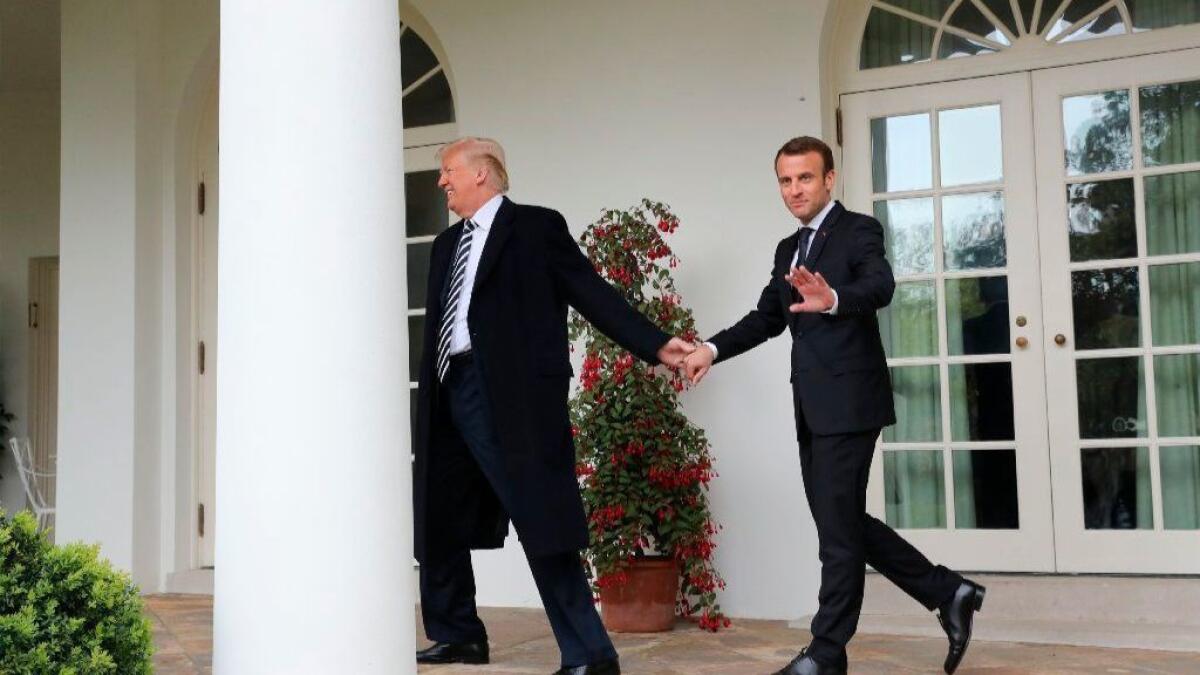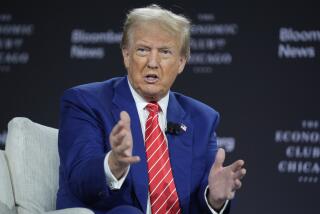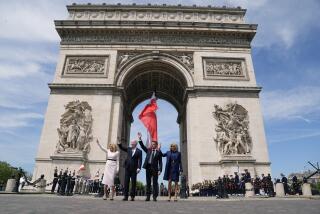Trump says there’s a ‘great shot’ at a new Iran deal, as Macron suggests. Or maybe not

Reporting from Washington — President Trump suggested on Tuesday that he would consider a plea from visiting French President Emmanuel Macron to renegotiate and expand the multinational Iran nuclear deal rather than follow through on his long-standing pledge to tear it up.
Macron, who came to Washington intent on salvaging the 2015 accord that dismantled Iran’s nuclear program through 2025, proposed “a new deal” to allay Trump’s concerns — by adding planks to contain Iran’s uranium enrichment, its missile programs and its support of militants throughout the region.
“I think we will have a great shot at doing a much bigger — maybe — deal, maybe not deal,” Trump said, equivocating as he often does, during a news conference with Macron. “We’re going to find out, but we’ll know fairly soon.”
Macron is on a three-day state visit, the first such formal event for a foreign leader in the Trump presidency, reflecting the affinity between the two leaders. With a May 12 deadline looming for Trump to waive U.S. sanctions against Iran, in keeping with the Iran deal brokered by the Obama administration, Macron’s main mission is preserving the pact. Trump, who has reluctantly waived sanctions in the past, has vowed he would not do so again.
That would probably unravel the deal. Besides the United States, France and Iran, the parties to the accord are Britain, Germany, Russia, China and the European Union. Like France, they maintain support for it. Whether they are open to renegotiation was unclear.
Macron said he and Trump held frank discussions; likewise in public, side by side before reporters, they frankly conveyed their differences. The French president acknowledged that Trump had campaigned against the deal, yet he seemed to appeal to Trump’s instinctive desire to hatch something big, outdoing his predecessors, by pressing him to renegotiate instead of scrapping it.
“This is the only way to bring about stability,” Macron said, adding that “France is not naive when it comes to Iran.”
He made the case that a new deal would not only keep Iran’s nuclear ambitions at bay, but also help bring a political settlement to the Syrian civil war — another issue in which Macron is trying to persuade Trump to stay the course. Trump repeated that he is eager to withdraw remaining U.S. troops from Syria, while France wants the United States to keep a force in the war-torn country as a counterbalance to Iran and Russia.
“We need to win peace and make sure that Syria does not fall into any hegemony in the region,” Macron said, singling out Iran for its influence over the Syrian government of Bashar Assad.
Trump not only stopped short of endorsing a new Iran deal, in public he mostly disparaged the existing pact as “a disaster.”
“It’s insane. It’s ridiculous. It should never have been made. But we will be talking about it,” Trump told reporters as the two leaders sat in the Oval Office for their first business meeting early Tuesday.
Against such criticisms of the accord he favored, Macron stood gamely by, seemingly willing to risk political capital to sway Trump. He even endured an awkward gesture by the U.S. president, who at one point — before the television cameras and French and American reporters — drew attention to dandruff on Macron’s coat.
“We have a very special relationship. In fact, I’ll get that little piece of dandruff off,” Trump said, brushing at Macron’s lapel. “We have to make him perfect — he is perfect.”
During one meeting attended by officials from both countries, Trump separately expressed optimism about his still-unscheduled meeting with North Korean dictator Kim Jong Un this spring, calling him “very honorable.”
Questioned at the news conference about his kind words for an autocrat accused of starving his people, among other abuses, Trump said, “I haven’t even discussed a concession, other than the fact that meeting is a great thing.”
Trump has formed a close bond with Macron, but sounded like a man who might yet disappoint his friend. He complained that the deal to dismantle Iran’s nuclear program gave the country too much money and no restrictions on its separate activities to develop missiles and make trouble internationally. (The money Iran got was its own, assets that had been long frozen until it complied with the 2015 accord.)
“It just seems that no matter where you go, especially in the Middle East, Iran is behind it. Wherever there’s trouble — Yemen, Syria — no matter where you have it, Iran is behind it,” Trump said. “And now, unfortunately, Russia is getting more and more involved.”
Trump spoke vaguely but ominously about how the United States would contain Iran if it resumes its nuclear weapons development. “If they restart their nuclear program,” he said, “then they will have bigger problems than they’ve ever had before.”
Macron emphasized the agreement’s geopolitical benefits, to underscore the case that an enhanced deal would accomplish some of what concerned Trump.
“The Iran deal is an important issue but we have to take a far broader picture, which is security in the overall region,” he said.
Policy analysts saw a shift — or a potential shift — on Trump’s part.
Joe Cirincione, president of the Ploughshares Fund, which supports the Iran deal, said that initially, after Trump’s more critical remarks in the morning Oval Office meeting with Macron, “I thought President Trump was on the verge of declaring war on Iran if it broke the limits” on nuclear production.
“By the afternoon,” Cirincione said, “he appeared to agree with the French president that it was better to build on the deal and not tear it up.”
Behnam Ben Taleblu, a senior fellow at the Foundation for the Defense of Democracies, which previously lobbied against the agreement, said Macron appeared to be laying the groundwork for framing the Iran issue “in a way more palatable to the American people” — and to Trump.
Several analysts said Macron, more than other world leaders, had learned how to manipulate Trump, who seems to genuinely like Macron.
“Macron has apparently convinced Trump that he can have a bigger deal by building, not tearing down, [and] helped Trump see that he can supplant Obama’s legacy,” Cirincione said.
Macron, 40, and Trump, 71, share a mutual sense that they were elected as outsiders, and disrupters. Macron has built the closest relationship with Trump of any leader in Europe — certainly more than Germany’s Angela Merkel, who is scheduled to visit on Friday — despite the fact that Trump is generally viewed on the continent with skepticism and alarm.
Their policy discussions were sandwiched between festive ceremonies honoring the friendship between their countries, and between themselves, following Macron’s arrival on Monday.
They shared a private dinner with their spouses on Monday at Mount Vernon, the Virginia plantation home of George Washington. On Tuesday morning, they participated in an elaborate welcoming ceremony at the White House, which included a military inspection and rousing speeches from both presidents about the Franco-American bond cemented through revolutions and two world wars over nearly 250 years.
“Let the United States and France stand forever in solidarity for the noble cause of liberty and peace,” Trump declared.
Macron spoke of their “appointment with history,” while trying to nudge Trump toward the international consensus not only on Iran but on climate change, trade and other issues on which he differs with the U.S. leader. He called on Trump to “resist the rise of aggressive nationalisms that deny our history and divide the world.”
“It is together that we will be able to act effectively for our planet,” Macron said. “I’m not just referring to climate, but also to the oceans, to biodiversity and to all forms of pollutions.”
“On this issue, we do not always agree as to the solutions,” he added. “But, in the end, such is the case in any family and in any friendship.”
Times staff writer Tracy Wilkinson contributed to this report.
Twitter: @noahbierman
UPDATES:
3:55 p.m.: The story was updated with additional reporting and analysis.
12:25 p.m.: The story was updated to include quotes from President Trump and Emmanuel Macron’s news conference, as well as analysis.
The story was originally published at 9:05 a.m.
More to Read
Get the L.A. Times Politics newsletter
Deeply reported insights into legislation, politics and policy from Sacramento, Washington and beyond. In your inbox three times per week.
You may occasionally receive promotional content from the Los Angeles Times.











